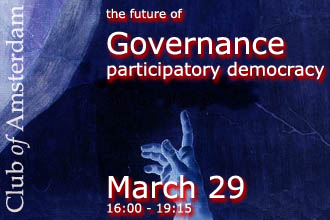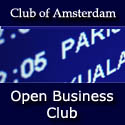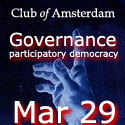
Your Voice on eGovernment 2010
| Your Voice on eGovernment 2010 by European Commission Information Society and Media Directorate-General Stakeholders of eGovernment in Europe had the opportunity to let their voice be heard on future eGovernment policy through an online consultation run from the 4th October to the 7th December 2005, at the website “Your Voice in Europe”. Executive summary From October to December 2005 an online public consultation was held via Your Voice (http://europa.eu.int/yourvoice/) on future eGovernment policy towards 2010. In total, 403 respondents (citizens, public administrations and businesses covering all the European Union Member States and a number of countries from outside of the EU) answered questions about: |
| inclusive eGovernment inclusive eGovernment citizen involvement, participation and democracy high impact services efficient & effective eGovernment key enablers About 92% of the respondents agreed with the suggested approach to focus eGovernment policy on a small number of priorities with high impact. The responses to the questionnaire strongly support objective-setting as formulated in the Ministerial Declaration adopted at the Manchester Ministerial Conference on 24 November 2005. Priority focuses for inclusive eGovernment policy towards 2010 were: the increase of the access and the use of public services by active promotion and more accessible solutions; the design of public policies and services by eGovernment in such a way, that no citizen and businesses risks being excluded; and a better access to market, tenders and business opportunities in the public sector to SMEs. The most significant main barriers to progress mentioned were: lack of interoperability; organisational barriers and the lack of ease of use. The preferred priority actions, according to the respondents include: proactive approach to be used by public administrations; training of public administrations, and exchange of good practices on inclusivity strategies and solutions at EU level. Concerning citizen involvement, participation and democracy, there is in general the opinion (64%), that eParticipation and eVoting can help or most likely help closing the democratic deficit. As main barriers are mentioned: lack of trust and security, insufficient access to information and communication technologies and lack of leadership. Main actions should be providing of solutions for eParticipation by a choice of channels (e.g. TV, cell-phone…), exchange of experiences and solutions as well as the creation of awareness. Citizens mobility and social security, citizens mobility in work and public eProcurement are the main high impact services on which eGovernment policy should focus by 2010. The respondents have seen as main barriers again the lack of interoperability, organisational barriers followed by national legislation. They recommended as main actions the exchanging of experience on technical and non-technical aspects, support by the structural funds and CIP and provision of incentives to share in developments of solutions. In electronic public procurement, 50-99% public procurement take-up was mentioned most frequently as target by 2010. Main actions in this area should be harmonised electronic signatures to enable the replacement of paper documents and changes in national legislation. In efficient & effective eGovernment , the most important objectives to be achieved by 2010 are stated to be improving the quality of services, based on user satisfaction and reducing the administrative burden for businesses and citizens. As main barriers, lack of interoperability,organisational barriers and insufficient skills of the administration were identified. As main actions, good practice sharing, development of innovative and transformative eGovernment solutions at EU level as well as activities for stimulating the use of open standards and pooling software were recommended. The European eGovernment policy should focus on electronic identification and authentication, good practice and solutions sharing and organisational change as key enablers. 88% of the respondents agreed or strongly agreed that the use of national electronic identification schemes in secure and trustworthy transactions with eGovernment services in other Member States should be enabled. As main barriers in realising electronic identification & authentication for public services across borders were seen the lack of interoperability, national legislation and lack of awareness of benefits. The main actions should be: mutual recognition of electronic identities provided by Member States, a federated, multilevel e-Identity model, and a framework for interoperable electronic documents. Changes in EU legislation do not play a strong role in the proposed actions in each of the areas. |
Values and Spirituality

Summit for the Future 2006 on Risk May 3-5
from the program ….
Interdisciplinary Stream:
Values and Spirituality
Why do human beings resort so quickly to armed conflict when it is so clear that no one really wins wars? Why do we refuse to adapt dialogue and reconciliation as means to resolving conflict in spite of evidence that it works and wars don’t? Why is there such widespread public legitimacy for outmoded ways of thinking about leadership and the future? Are human beings ready to leap into a new consciousness, a more mature stage in our evolution, and become “global patriots”? There is no doubt that we have the ability to make this leap. The question: will we choose to?

John Renesch, Author, Getting to the Better Future: A Matter of Conscious Choosing
Conscious Living, Conscious Work: Becoming Global Patriots
San Francisco-based author John Renesch points to the opportunity facing humankind to consciously evolve to a new and unprecedented level of maturity, and create a just, sustainable and compassionate world. By adopting a new worldview, human beings can take advantage of the extraordinary possibilities that are inherent in what he refers to as “a communion of technology with spirit,” or co-creation. This option has never before been available in human history and, if recognized and acted upon, can launch us into a new era of maturity, wisdom and consciousness.

Bill Liao, Senior Partner & Director, openBC / CEO Finaxis AG
Reputation Risk – how to survive networking in the digital age
Reputation is closely linked to your system of values …
Manging risk to your reputation involves
– identifying your values …
– communicating them clearly and
– making sure to reflect them in your actions …
Moderated by Jonathan Marks, Director, Critical Distance BV
Club of Amsterdam blog
 | Club of Amsterdam blog October 26: Synthesis of elBulli cuisine October 14: The new Corinthians: How the Web is socialising journalism September 20: A Future Love Story |
News about the future of Governance

“eCitizenship for All” 2005 benchmark survey
eEurope: In the context of eEurope, the survey focused on the following three topics: restructuring of services, so that more services can be provided electronically; encouraging citizens to use the Internet; and the rolling-out of broadband infrastructures. Most of the participating cities are taking a long-term approach towards eGovernment. […]
Employment: A majority of cities have developed policies to support the creation of new jobs in the knowledge economy. Those participating cities that were able to provide figures reported that they had managed to achieve an increase in the numbers of new jobs being created – with an average increase of 7%. Most cities have also developed policies establishing new facilities for business. […]
Education: To participate fully in the Information Society, […] Most cities are working directly with schools and/or with other providers of education, although there are significant differences between cities in different countries, related to the differing roles of local governments in the field of education.
Governance: Good governance – in terms of transparency, accountability, efficiency and effectiveness – is a critical success factor for achieving the Lisbon goals. […] There is a positive correlation between the level of achievement of the Lisbon goals and the instruments of governance used for justification of expenditures to outside stakeholders and the assessment of policy effectiveness. External demand for justifications of expenditures and transparency in measuring actual results appears to have a greater influence than internal operations and responsibilities.

eCitizen portal in Singapore
The eCitizen portal heralds a new era for the Singapore Public Service by transforming the way in which the public interacts with government agencies. Under the e-Government Action Plan, all public services that are suitable for electronic delivery or can tap on electronic channels to improve service delivery will be designated for transformation. This is in line with Singapore’s vision for service excellence among all government agencies.
News about the Future

aXbo registers your individual optimal wake up time via your body movements and wakes you up in between the last 30 minutes before your wake up time. Your movements are detected and gathered with a comfortable towelling wristband and submitted to the sleep phase alarm clock.

8GB Hard Disk embedded in smartphone
Samsung Electronics Co., Ltd, a leading provider of mobile phones and telecom systems, is reinforcing its technology leadership by unveiling the world’s first 8GB Hard Disk embedded smartphone (model: SGH-i310).
The i310 combines a phone, a digital camera, and a MP3 player with its immense storage capacity. It enables users to carry around 2,000 songs (4MB/song) wherever they go.
Next Event: Wednesday, March 29, 16:30-19:15

the future of Governance
participatory democracy
Wednesday, March 29, 2006
Registration: 16:00-16:30, Conference: 16:30-19:15
Where: Info.nl, Sint Antoniesbreestraat 16, 1011 HB Amsterdam [next to Nieuwmarkt]
With
Joop de Wit, Institute of Social Studies: Managing the Indian Metropolis:
New Forms of Governance in Mumbai and Delhi
Oebele Bruinsma, Synmind bv:
Order from Chaos
Wybren Meijer & Pieter Pijlman, Futureconsult:
Scenarios on Local Governance and Participatory Democracy – Method and Outcomes
and our Moderator John Grüter, Systems Thinker, ICT Generalist, Technology Affectionado, Change Agent, Principal, Digital Knowledge
Summit for the Future blog
 | Summit for the Future blog http://summitforthefuture.blogspot.com July 13: Summary of the Summit for the Future 2006 May 22: Dispatches from the Frontier |
Recommended Book

Getting to the Better Future: A Matter of Conscious Choosing
by John E. Renesch, Anita Roddick
This latest book by John Renesch puts forth a vision for historic transformation for all humankind. It pictures a global future full of possibilities – a much “better future” than the one that appears most likely if we rely upon probabilities and forecasts based on existing trends. Not only that, but the author points directly to the business community as the segment of our society that can best lead the rest of the world in such an incredible transition for all humanity.
Consumer Idealized Design
Consumer Idealized Design: Involving Consumers in The Product Development Process
by Susan Ciccantelli and Jason Magidson
A product or service is designed effectively if it provides consumers with what they want, rather than merely removing what they do not want. But determining what consumers need or will want is an effort that does not often meet with success. In fact, suppliers’ beliefs about consumers’ wants have led to more product failures than successes. The main reason for this is not hard to understand: Consumers’ needs and desires are elusive because consumers themselves generally have not consciously formulated what they are or how to fulfill them.
Even when consumers are aware of what they want and are willing to reveal it, their wants are likely to be conditioned by what is available. And when the product or service available is basically unsatisfying to them, they are unlikely to reveal startling new desires or concepts. At best, the typical ways in which consumers are involved in product design-focus groups, surveys and questionnaires-tend to elicit mostly information about what they do not want, rather than startling new insights about what they really want or need. This is due in part to the fact that people often attempt to provide answers that they think the inquirer wants, rather than probe for their own preferences.
So the search continues, and product developers continue to seek ways to help consumers (1) become more aware of what they need or want, and (2) reveal these wants as accurately as possible. One such way, developed by Russell L. Ackoff, is a process called Consumer Idealized Design (Consumer Design).
Consumer Idealized Design
Consumer design involves actual or potential consumers in an unconstrained design of their ideal product or service.
In consumer design, participants are told not to be concerned with the feasibility of the designs they create, only with their desirability. They are also encouraged to specify ways in which the product might be made flexible enough to accommodate changes in consumers’ needs. In proposing the design, consumer participants are free of all constraints except two:
(1) The product or service cannot involve any technology that does not currently exist.
For example, a participant could say that she wants publicly available drive-it-yourself taxis that are coin-operated, because the technology exists to construct them. On the other hand, she cannot say that she wants an automobile that can run on water, since this is not possible using current (proven) technology.
In some cases, knowing whether technology exists to realize consumers’ designs may be difficult to assess. However, we have found that the collective knowledge of a group is generally sufficient to make decisions regarding the inclusion of uncertain technological capabilities. The product or service must conform to the law. This constraint extends to any rules or regulations imposed by the government that limit the use of the product or service. For example, one cannot design an automobile that emits a poisonous gas.
Consumer design starts from the ground up and ignores feasibility in the early stages of the design process. This is because it is based on the belief that the principal obstruction to creativity is a preoccupation with feasibility, a condition that is usually associated with self-imposed (rather than actual) constraints.
Consumer design assumes that, given the proper tools and facilitation, average consumers are often best equipped to design-from a functional standpoint-those products and services that are required for situations with which they have become familiar. It is this input from consumers early on in the product development process that differentiates consumer design sessions from traditional focus groups and surveys.
[…]
Ice Hotel Quebec-Canada
Ice Hotel Quebec-Canada
The Ice Hotel Quebec-Canada, located just outside Quebec City, will be open from January to April, 2006. The architecture of the Ice Hotel is unique every year.
Each year talented artists create even more intricate and intriguing designs. This magnificent architectural wonder offers sensational experiences that are sure to please anyone who visits or spends the night.
Photos by Sandra Bellefoy, friend and ambassador to the Ice Hotel:
Announcements

9th International Conference on Technology Policy and Innovation “SCIENCE, SOCIETY AND SUSTAINABILITY”
Santorini, Greece, 18-21 June 2006
Agenda
| April 26 the future of Drugs & Pharma Wednesday, April 26, 2006, 16:00-19:15 Location: Info.nl, Sint Antoniesbreestraat 16, 1011 HB Amsterdam [Next to Nieuwmarkt] May 3 Opening Event Summit for the Future 2006 May 3, morning When: Wednesday, May 3, 2006, 09:30-12:00Registration Desk: 08:30-09:30 Where: HES School of Economics and Business, Fraijlemaborg 133, 1102 CV Amsterdam Zuidoost May 3-5 Summit for the Future 2006 May 3-5, 2006 The topics are Life Sciences, Media & Entertainment, Trade – Asia, Healthcare, Corporate Governance, Innovation as Risk Taking, Knowledge based Risk Management, Values and Spirituality, Cross-Cultural Competence and Creative Leadership. Where: HES School of Economics and Business, Fraijlemaborg 133, 1102 CV Amsterdam Zuidoost Information |
| May 31 the future of Reputation Management |
| June 28 the future of Journalism / Ethics in Journalism |
Club of Amsterdam Open Business Club
 | Club of Amsterdam Open Business Club Are you interested in networking, sharing visions, ideas about your future, the future of your industry, society, discussing issues, which are relevant for yourself as well as for the ‘global’ community? The future starts now – join our online platform … |











Customer Reviews
Thanks for submitting your comment!